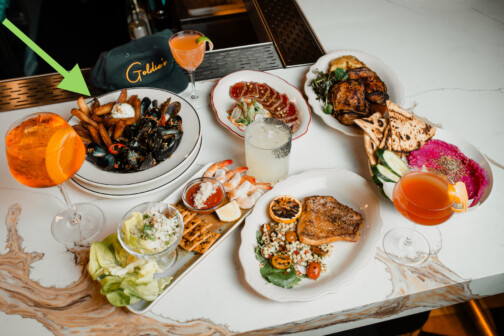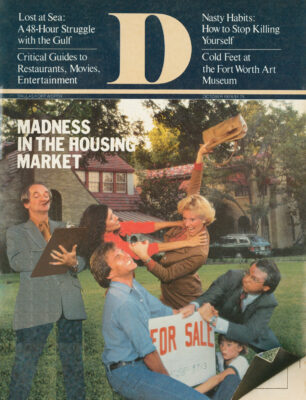You’re waiting in line for a movie. You cross your arms tightly and tap your foot. “Damn, why didn’t I leave earlier?” you mutter. “I probably won’t even get in after all this.” Now you start pacing. Others in line are chatting, laughing. This only makes you madder.
You’re sitting in traffic. No one’s moving. You think about all the things you have to get done, all the time you’re wasting. You pound your fist on the horn and yell: “Come one, move it!”
You’re sitting at your desk, facing a report your boss wants this afternoon. You can’t get started. You consider ripping the clock off the wall, but you light a cigarette instead. “I’ll never figure out how to organize this mess. God, why didn’t I start days ago?” You look at the clock again – you’ve wasted ten more minutes. Your heart is pounding; you can’t seem to concentrate.
What are you doing to yourself?
You’re killing yourself.
Every time you feel particularly tense, perceive a threat, or fear that you cannot cope, you are experiencing stress. And you are triggering a series of chemical reactions in the body called a “fight-or-flight reaction.” The heart beats faster; fatty substances and adrenal hormones pour into the blood; blood pressure rises, blood and food rush to the muscles – all to give you that burst of energy needed to fight or nee. But if you’re sitting there fuming in a traffic jam, the unused fat merely builds up in the veins and arteries. This buildup is arteriosclerosis, which in advanced stages becomes a clogging and hardening of the arteries. sclerosis.
Stress also increases the tendency of the blood to clot. Again, this is handy if you are wounded in a fight. But without an injury to attend to, clots can form just as easily in coronary arteries. When such a clot runs into an artery clogged by arteriosclerosis, it can mean a heart attack. Stress also makes the immune system less effective, which can leave you vulnerable to infection.
Acute stress can kill you. George Engel barely escaped. He had a heart attack one day before the first anniversary of his twin brother’s death. After recovering enough to resume work as a professor of psychiatry and medicine at the University of Rochester, he discovered he was not alone. As he reports in Psychology Today, emotional stress can kill in an instant.
● At a memorial concert honoring thelate Louis Armstrong, his widow wasstricken with a fatal heart attack as sheplayed the final chords of “St. LouisBlues.”
● Lyndon Johnson, soon after leavingoffice, described his Great Society programs as “a starving woman.” He said,”When she dies, I too will die.” The dayafter Richard Nixon’s inauguration for asecond term on January 20, 1973, he announced the complete dismantling of theGreat Society. The next day Johnson diedof a heart attack.
● A 56-year-old minister suffered a fatal heart attack after talking to PresidentCarter on his highly publicized radiophone-in show. His widow said simply:”He was very elated and delighted to havetalked with the President.”
Though it may be difficult to ward off acute stress, it is possible to defuse daily tensions. The first step is to realize that stress and worry do not keep you on your toes, as many would like to believe. They undermine your concentration, fritter away your energy, and eat away at your ability to fight off illness. Many don’t even know when they are fueling their own tension. Robert Woolfolk and Frank Richardson suggest in their just-published book, Stress Sanity and Survival, that people try listening to the way they talk to themselves. Instead of thinking, “God, I’ll never finish,” they suggest substituting, “Relax. Just take it one step at a time. And if you don’t finish, it’s not the end of the world.”
Woolfolk and Richardson also recommend relaxation exercises, and they outline three simple steps for meditation. You don’t need magic mantras or lotus positions.
Sit in a comfortable position, back straight or supported, in a quiet room – phone off the hook, lights dim, eyes closed.
Stay still.
Concentrate continuously on an object, a sound, or a bodily process such as your breathing. When you find your mind wandering to worries of the day, slowly repeat a soothing sound or focus again on your breathing by repeating softly iin-n-n-n, ow-ow-ow-ow-t-t-t-t. Try it twice a day for 15 to 20 minutes.
Under stress your muscles tense up to prepare you to pounce. If you haven’t done any good pouncing, you may wind up with headaches, muscles aches, and insomnia at the end of the day. Muscle relaxation helps. When going to bed at night, lie down and run through all the major muscles in your body, from fingers to toes, right side and left, tensing them and relaxing them. Start with your right hand and forearm, clench your fist for seven seconds while concentrating on what it feels like to be tense, then relax it while concentrating on the tingling pleasure of relaxation. Do the left side. Move up the arm, to the forehead, down the face through the jaws, neck, shoulders, stomach, thighs, calves, and toes. Do it again, if you aren’t asleep yet.
If all else fails, you could move to the Platte River Valley in Nebraska, where the incidence of heart disease, strokes, lung cancer, and auto accidents among middle-aged men is one-third the national average. But bear in mind that the Platte River Valley drops to thirty degrees below zero in winter.
Loneliness is as lethal as larkspur, but you’ll never see a death certificate that reads: “Died of a broken heart.”
If we want to get at the root of health and sickness in America, says Dr. James Lynch, director of the Psychosomatic Clinic at the University of Maryland’s school of medicine, the medical profession and the public must face how “human companionship affects our hearts.” Referring to his book The Broken Heart: The Medical Consequences of Loneliness, Lynch says in a soft voice: “When I use the term broken heart it’s not some romantic metaphor. It’s a devastating medical reality.”
Lynch ticks off what his book catalogues in detail: People at every age who live alone have death rates two to three times higher than those of married individuals. The premature death rate (before age 70) for divorced men compared to married men is double for heart disease, double for cancer of the digestive system, double for stroke, five times higher for suicide, seven times higher for cirrhosis of the liver, triple for hypertension, seven times higher for homicide, ten times higher for tuberculosis. Every kind of cancer is higher for divorced men and women than for those who are married – as much as five times higher. “These are not trivial differences,” he says.
Other physicians agree with Lynch’s analysis but are at a loss for an answer. “There’s no question that modern society builds walls around us and that we’d be healthier if the walls came down,” concedes Robert Huntley, president of Georgetown University’s Community Health Plan. “It’s not the sort of thing that can be applied clinically, though. How can you prescribe an undivorce?”
Lynch says the way to start is by attacking medical myths. “We have to abandon this Christiaan Barnard myth of health. We believe we can do anything we want and then seven plumbers in South Africa will fix the damage.” He tells patients that they are not hapless victims. “I have to tell them not to say, ’My blood pressure went up.’ They must say, ’I drove my blood pressure up.’ Then they’re on their way to controlling it.”
I am not a health nut. Granted, my friends used to gather around my desk, eye my lunch of nuts, raw carrots, cheese, and fruits, and hoot: “She’s at the birdseed again.” I am not a food fanatic. All I want to know is whether I’m eating the foods that will keep me as healthy and energetic as possible.
I went to my physician and asked whether I was getting all the vitamins and minerals I needed. I knew that I usually ate well, but I had also heard that women are often deficient in iron, that aspirin and antibiotics can destroy Vitamin C, that sleeping pills break down B vitamins, that stress and birth control pills eat up the B-complex vitamins as well as Vitamin C, that smoking kills a whole host of vitamins and minerals. But the doctor could tell me only that I wasn’t anemic – which meant iron deficiency was unlikely though not impossible. And, beyond that, if I wasn’t sick I shouldn’t worry.
The problem is that no one knows very much about nutrition. Most nutritionists agree that nobody knows enough about optimum levels of nutrients to start prescribing a supplement here and a supplement there. A good one-a-day vitamin gets the nod from nearly everyone – maybe two if you’re sick or feeling stress. What your body doesn’t use of most vitamins, it flushes out. But large doses of vitamins such as A, D, and E can be toxic. And taking too much of some substances like vitamin B2 can lead to a deficiency in others, like B6.
As for the megavitamin craze, reports are mixed. Physicians denounce it as quackery, and believers swear that it does everything from curing cancer to improving orgasms. The theory behind megavitamins is not simply that if a little is good, a lot is better. The notion – and it is gaining some support in medical circles – is that we are exposed to more dangerous synthetic chemicals, processed foods, and daily stresses than we were a few decades ago. It may be that the previously recommended daily allowances for nutrients are not enough to ward off the diseases that new hazards may induce. But the problem still is that no one knows exactly what or how much we need.
Salt and Hypertension: “If people cut consumption to five grams of salt a day, the disease would disappear entirely,” says John Weisburger of the American Heart Foundation. This would require not only reducing the amount of salt added to foods, but limiting foods that are high in salt, such as canned salmon and tuna, corned beef, bacon, garlic, celery, onions, and junk foods. The French government has instructed bread bakers in that country to reduce the salt in bread gradually over the next five years.
The Pill, Smoking, and You Name It: No time for moralizing – here are the facts. A 40-year-old woman who takes the pill and smokes has nine times the risk of cancer as other women, five to ten times the risk of a heart attack; smoking alone carries three times the risk of bronchial complications. If pregnant, she has six times the chances for a stillbirth and is more likely to have a small baby.
Aspirin and Heart Attacks: Three aspirins a day may prevent heart attacks – at least that’s what the National Institutes of Health suspects and is spending $17 million to find out. Aspirin is believed to prevent the clumping of platelets and fatty debris in blood vessels. Michael Halberstam, a heart specialist in Washington, D.C., says that because there’s no danger, he’s not waiting for final results. He already takes three a day. Aspirin does not seem to have the same effect on women.
Wine, Viruses, and Mellow: People who drink moderately – a couple of drinks a day – live longer than teetotalers or heavy drinkers. And Science magazine recently reported that the tannins and phenols in wine may inactivate viruses with which they come into contact. Sad news: White wine does not contain most of the phenols, and grape juice is an even richer source than red wine.
Less Food and Longer Life: At NIH’s Institute on Aging in Baltimore, Maryland, animals that were fed a low-protein diet and were left to fast every other day lived 50-percent longer than normal. Dr. Charles Barrows at the Institute says there’s more work to do. But just in case, he has lost 20 pounds.
Sugar and Shorter Life: Sugar is not simply empty calories; it is a leech. Because it does not contain any of the vitamins and minerals needed for its own breakdown and assimilation, it steals these nutrients from other foods or from stored deposits in the body. Sugar consumption can lead to diabetes, which in turn paves the way for heart disease. You may live just long enough to watch all your teeth fall out – a sign of disease and by no means a necessary part of aging. Most important and least discussed is the discovery by a Loma Linda University nutritionist that sugar cuts in half the white blood cells’ ability to destroy bacteria.
xercise is as good an antidepressant as the antidepressant drugs,” says Donald Vickery, MD, author of a book to be published this month called Lifeplan for Your Health. He says a Los Angeles psychiatrist found that going out and running with his schizophrenic patients produced much better results than sitting and talking with them.
Exercise also reduces the fat concentration in the blood. Although cholesterol and triglycerides are still of concern, current interest is focused on fat-carrying molecules called lipoproteins. There are two types: high-density lipoproteins, said to be the good guys that defend against buildup of fat in the arteries; and low-density lipoproteins, which build up and cause trouble. Exercise is said to alter the body’s balance of the two by increasing the beneficial highs and decreasing the lows. This rebalancing becomes even more significant when you realize that 80 percent of the cholesterol in the body is manufactured by the body. Thus there is some doubt whether fat in the diet can affect cholesterol levels nearly as significantly as exercise can.
But the exercise has to be vigorous enough to raise your heartbeat to 120 for 15 to 20 minutes, three times a week. Golf doesn’t count. Tennis will do if you run around a lot, but not if you play doubles or discuss strategy between shots. Running, cycling, swimming, and walking are best.
Longer life may even be a by-product of exercise. A joint study at Harvard University’s medical school and Trinity in Dublin followed sets of brothers who split up, one staying in Ireland, the other in Boston. The siblings in Ireland ate considerably more, including three and a half pounds of butter and 18 eggs a week. Yet after 30 years they weighed less and had lower levels of triglycerides, lower blood pressure, and less likelihood of developing heart disease than their Boston brothers had. One difference was that they were much more active.
Sex is an excellent form of exercise, especially for dieters. It doesn’t burn up a lot of calories, but it is a fine way to take your mind off food. The only debate concerns whether it’s good exercise for recovering heart attack patients. A recent Journal of the American Medical Association editorial points out that there is only one report of a heart attack occurring during intercourse, and even that is not well documented. The editorial concludes that because the current theory is that exercise helps heart attack victims recover, doctors should be prescribing sex as therapy instead of advising restraint.
In a Japanese study on sudden deaths, the researcher found that of the very few cases that involved sexual intercourse, 80 percent of the deaths had occurred during extramarital affairs.
It’s one thing to know what you’re doing to kill yourself slowly. It’s another thing to change – before the crisis hits. One way is to create an artificial crisis. Get someone to analyze your health risks and write down just how much your habits are shortening your life expectancy. There are several companies that will do it.
Medical Datamation, for example, sends a questionnaire asking you about your habits, smoking, drinking, family history, emotions, attitudes. Then it sends you back a printout showing how your life expectancy stacks up against that of the average man or woman of your age and race, and how many years you could add to your life by changing your habits (such as wearing a seat belt, losing weight, lowering cholesterol).
The following companies do health risk analysis: Interhealth, 2970 Fifth Avenue, San Diego, CA 92103; Lifestyle Development Program, University of Wisconsin, Stevens Point, WI 54481; Medical Datamation, Southwest and Harrison Streets, Bellevue, OH 44811; and Prospective Medicine, Methodist Hospital, 1604 N. Capitol Street, Indianapolis, IN 46202.
Related Articles

Restaurant Openings and Closings
East Dallas’ All-Time Favorite Fries Are (Kinda, Almost) Back
Remember the fries from 20 Feet Seafood Joint? Of course you do. Boy, do we have some good news about a new place called Goldie’s.
Local News
Leading Off (4/16/24)
Cloudy today, with a high of 88 and chances legal proceedings
By Tim Rogers



